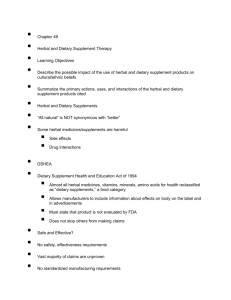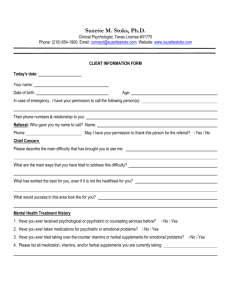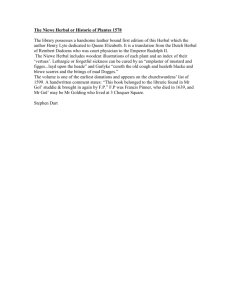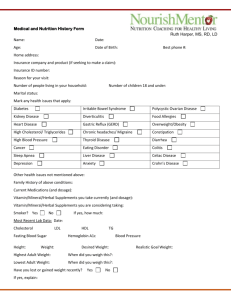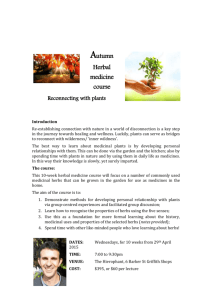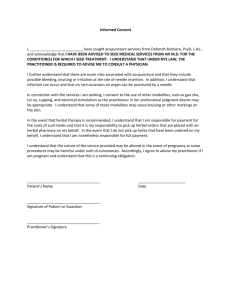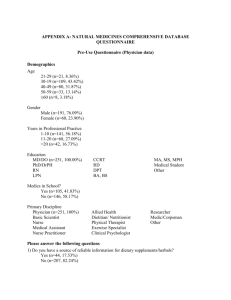Herbal Remedies for High Blood Pressure
advertisement
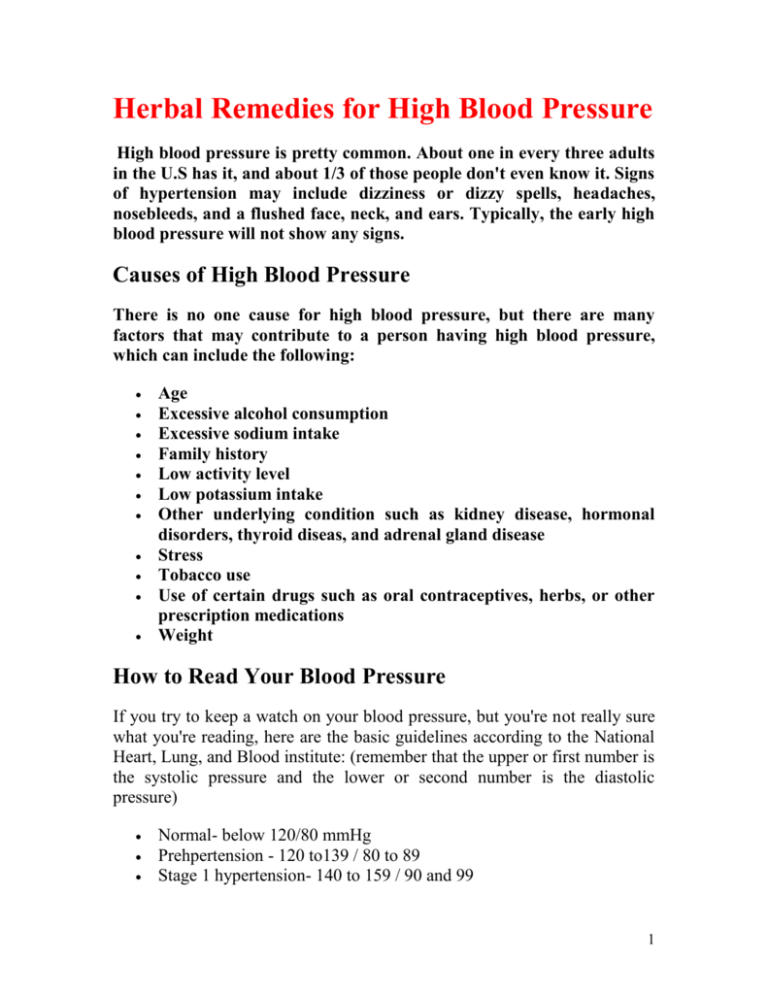
Herbal Remedies for High Blood Pressure High blood pressure is pretty common. About one in every three adults in the U.S has it, and about 1/3 of those people don't even know it. Signs of hypertension may include dizziness or dizzy spells, headaches, nosebleeds, and a flushed face, neck, and ears. Typically, the early high blood pressure will not show any signs. Causes of High Blood Pressure There is no one cause for high blood pressure, but there are many factors that may contribute to a person having high blood pressure, which can include the following: Age Excessive alcohol consumption Excessive sodium intake Family history Low activity level Low potassium intake Other underlying condition such as kidney disease, hormonal disorders, thyroid diseas, and adrenal gland disease Stress Tobacco use Use of certain drugs such as oral contraceptives, herbs, or other prescription medications Weight How to Read Your Blood Pressure If you try to keep a watch on your blood pressure, but you're not really sure what you're reading, here are the basic guidelines according to the National Heart, Lung, and Blood institute: (remember that the upper or first number is the systolic pressure and the lower or second number is the diastolic pressure) Normal- below 120/80 mmHg Prehpertension - 120 to139 / 80 to 89 Stage 1 hypertension- 140 to 159 / 90 and 99 1 Stage 2 hypertension- 160+ / 100+ Herbal Remedies to Treat Hypertension Your doctor may want to prescribe a medication for you to take daily, but if your blood pressure is in the lower stages, you may be able to manage it naturally and herbally. Just try to work with your doctor and figure out the best treatment, as high blood pressure can damage your organs, increase risk of stroke or heart attack, cause brain hemorrhage, vision loss, and even kidney disease. Coenzyme Q10 Coenzyme Q10 is thought to reduce high blood pressure by improving the function of the blood vessel walls. There was a study that showed after 12 weeks of supplementing with the Coenzyme Q10, people with high blood pressure say a reduction in their systolic blood pressure and diastolic blood pressure. Some people saw a reduction of about 6.1 mmHG and 2.9 mmHg. The study also showed that there was a reduction in the long-term marker for glycemic control (HbA1C). Fish Oil and Omega 3 Fish oil is thought to have a modest effect on high blood pressure because the fish oil and omega 3 fatty acids will actually dilate the blood vessels. There was a study that showed by adding fish oil supplements to your diet, the DHA (docohexaenoic acid) and EPA (eicosapentaenoic acid) in the fish oil will lower high blood pressure. Garlic Garlic has been seen to have many herbal benefits, and for those who suffer high blood pressure may find that by taking garlic supplements, you can significantly lower the systolic blood pressure and diastolic blood pressure. There have been many studies on the effect of garlic and blood pressure, and about 3 to 4 studies show a reduction. 2 If you opt to try garlic supplements, you want to do sounder the supervision of your doctor, as garlic can thin the blood, and it may interact with other drugs and supplements, such as prescription blood thinners, vitamin E, and gingko. As an herbal remedy, garlic can lower cholesterol levels, prevent blood clots, and destroy plaque, as well as lower blood pressure after 12 weeks of supplementing. Hawthorn Hawthorn is traditionally used by all-natural doctors for high blood pressure. Studies have shown that after 16 weeks of hawthorn supplements, patients saw a significant reduction in the diastolic blood pressure. Generally, hawthorn is seen as one of the safest herbal remedies as there haven't been any drug interaction or adverse side effects. Hawthorn supplements have been the most popular alternative medicine used for cardiovascular illnesses. Hawthorn berries are used to treat cardiovascular disease by many cultures and all-natural doctors. They have been proven to protect the arterial walls, lower blood pressure by dilating the blood vessels, and strengthen the heart's pumping ability. Folic Acid Folic acid has been proven to lower the homocysteine levels in the blood, which in turn helps to lower blood pressure. When the homoxysteine levels (an amino acid) are high, there can be damage to the lining of the arteries, cause higher risk of blood clots. One study showed that after 4 weeks of supplementing with folic acid, blood pressure was reduced, especially in cigarette smokers. Arjuna Arjuna is an herbal supplement that protects the heart, strengthens circulation, and helps the overall tone of the heart. The supplement has been proven to stop bleeding and promote healing after a heart attack. 3 The arjuna supplement is helpful to reducing high blood pressure because the bark from the Arjuna tree is very rich in the coenzyme Q10, which is a popular supplement for cardio-health to help prevent heart problems, ease stress on the heart, act as a diuretic, aids to balance cholesterol, and relieves hypertension. Guggul Guggul has been proven to lower blood-fat levels in the body and raise the good cholesterol. It's also been proven useful aiding with atherosclerosis, psoriasis and cardiac ischemia. By supplementing a healthy diet with guggul, blood cholesterol can reduce by 14 to 27% and triglycerides by 22 to 30%. By lowering blood cholesterol levels. The supplement has strong rejuvenating powers and after 4 to 12 weeks, you may see weight loss, lower cholesterol, and improved circulation, which can help reduce blood pressure. Rauwolfia Serpentina Rauwolfia Serpentina, also known as snakeroot, is a powerful herbal supplement that can help reduce blood pressure with just one dose. After the first dose of snakeroot, you will see lower blood pressure after a few days, so don't keep taking it until your see a change. Do be careful when using rauwolfia serpentina, as some patients have reported side effects such as nasal congestion, dizziness, nausea, and dry mouth. Other Supplements and Herbal Remedies to Aid Hypertension There are many different herbs and supplements that you can try to lower blood pressure, and some will work and some won't. Not everyone's body is made the same, so you will have to find the herbal supplements that work for you. Just remember that some herbs have side effects that you will need to watch out for. Also, make sure that you consult your doctor before using and self-dosing any herbal remedies. What you can do to help lower blood pressure, is to make sure that you change your lifestyle and diet. With basic herbal supplements, you can 4 potentially help your body acclimate so that you don't need to take prescription blood pressure medicines. The following list, is one of commonly used natural supplements that have been proven effective. Calcium: An element that has an effect on blood pressure, so with supplementation, calcium can help improve the heart muscle contractions and potentially have a modest reduction in systolic blood pressure and a significant reduction in diastolic blood pressure. Magnesium: A supplement that is required to utilize calcium in the body and to regulate calcium in blood cells. It's been proven to help reduce diastolic blood pressure, but it doesn't seem to have a major effect on systolic blood pressure. Potassium: A supplement that may reduce both systolic and diastolic blood pressure. Vitamin C: Dilates the blood vessels, which can potentially help lower blood pressure. Vitamin E: An antioxidant that dilates the blood vessels and protects them from damage, which in turn can potentially lower blood pressure. Herbs to Avoid It is thought that the following herbs may have some effect in causing high blood pressure. It is recommended that you avoid these herbs as best that you can, especially if you have a history of hypertension. Licorice Ephedra Asian Ginseng Rosemary essential oil Dr. Darius Homi Umrigar MD (AM), 5
